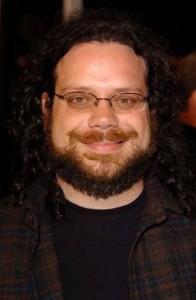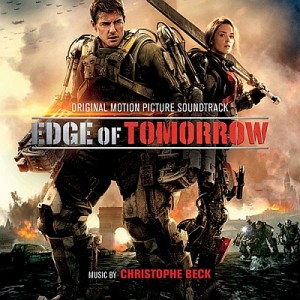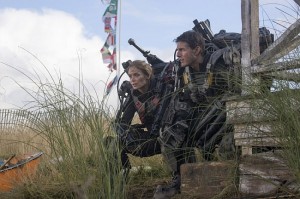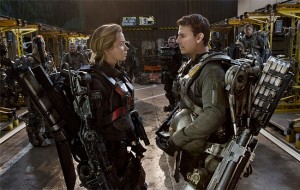In the two or so decades since Christophe Beck followed Howard Shore and Mychael Danna as one of Hollywood’s most valuable Canadian composing imports, the burly, bearded and bespectacled musician has become an exemplar on how to incorporate a pop-rock sensibility into an old school, and often orchestral talent for melody. It’s a hummable talent that’s made him a go-to guy for teen hijinks (THE PERFECT MAN, A CINDERELLA STORY), rhythmically swooning romance (GUINEVERE, UNDER THE TUSCAN SUN), talking animals (GARFIELD, THE MUPPETS) and thoroughly R-rated bad boy behavior (THE HANGOVER, HOT TUB TIME MACHINE) – all before really hitting it big in the animated Mouse House with the short PAPERMAN and the mega-success of FROZEN, whose score was the definitely of whimsically icy enchantment.
But beyond the toe-tapping harmonies, energetic cartoon pratfalls and ribald electric guitars, one of Beck’s most exciting, if not as frequently tapped reservoirs of creative energy, has been in the arena of action, adventure and suspense. Sure he’s held any number of weapons, venturing from the undead-killing instruments that put him on the map with the BUFFY THE VAMPIRE SLAYER TV series to ELEKTRA‘s sais, THE SENTINEL‘s percussive pistol-shooting and the first PERCY JACKSON‘s heroic sword-swinging. But no musical arsenal that Beck has wielded can truly match the BFG (i.e. “Big Expletive Gun”) of EDGE OF TOMORROW. Here Beck blasts away with patriotic strings, muscular brass, gnarly samples and alt. percussion, all while wearing an armor-packed suit that would give Iron Man a hernia. It’s hard to believe that this hopeful blockbuster is actually the first time Beck has scored a science fiction action film, which he does with assured abandon. But that determinedly aggressive sound is part of the ironic humor of embodying Tom Cruise as Bill Cage, a yellow-bellied p.r. army flack who outdoes Bill Murray for a death rinse-and-repeats while steadily getting at defeating an alien invasion, especially when given the aid of Rita (Emily Blunt), a similarly affected female fighter who’s only to eager to blast Bill’s brains out for a level-up reset.
Directed by Doug Liman with the energetic, off-beat flair he’s given to such hit, character-driven action fare as THE BOURNE IDENTITY and MR. AND MRS. SMITH, EDGE OF TOMORROW proves that Christophe Beck doesn’t need a few hundred repeats to get the job done right when it comes to delivering the electro-orchestral power that genre’s scores demands at their multiplex heights, a mission that Beck takes on with gusto to reveal impressive new abilities in his stylistic arsenal.
ASSIGNMENT X: EDGE OF TOMORROW is essentially your first science fiction score, and on a pretty big level at that. If you’ve long been a fan of the genre and its music, what was it finally like to get this kind of opportunity? And how did it differ from the kind of score you may have imagined doing for it?
CHRISTOPHE BECK: It was quite terrifying actually! I’m always looking for variety in the projects I work on, and I tend to work on a lot of comedies. So, when I first got a chance at the gig, and had an opportunity to meet Doug Liman, who is a great director with a very good track record, I was pretty excited. But once I was actually hired, I went right to where I always go at the very beginning of every project… panic and insecurity. I’m experienced enough to know that this is temporary, but that doesn’t make it any less scary. Once I got through that, though, the ideas started coming. I try not to get too attached to these initial ideas, since they typically don’t survive the process, but I experimented with some ethnic ideas for the character of Rita, as well as a pretty cool heavily processed military drum concept. None made the final score, though.
AX: EDGE OF TOMORROW is also the first major studio score that director that Doug Liman has done without John Powell. What do you think it was about his music that appealed to Doug, and were there any conceptual lessons you took from those past scores in determining Doug’s taste for your first film with him?
BECK: What appeals to Doug about John’s music is what I would imagine appeals to everyone about John’s music. His scores are memorable, inherently musical, and impeccably produced, all while having a unique and original point of view. Besides a modernistic approach, I’m not sure I could really take anything from his work and apply it to EDGE OF TOMORROW, other than, “I hope it’s as awesome as what John would have done”. Not sure I succeeded, but I tried!
AX: Doug always brings an offbeat sensibility to his work. How would you describe that eccentricity in EDGE OF TOMORROW, and how did it apply to your collaboration?
BECK: You’re right, Doug is eccentric, not only in his work, but his personality and musical tastes as well. I think it’s what makes him such a great director, in fact. His eccentricity translates into a very unique sensibility artistically, that is still very commercial, in every aspect of his films, but especially music. He was always pushing me to find unconventional ways to approach scenes musically.
AX: How did you want to capture the “zero to hero” voyage of Bill, not only in him becoming a more proficient alien buster, but also towards realizing his heroic, and romantic potential?
BECK: There’s a key sequence in the film where we see Bill land on the beach, which, for us, is the third time we see him land. But for Cage, it’s the umpteenth time, perhaps several hundredth, and by now, he has transformed himself into a kind of super-soldier. The score during these repeated landing sequences mirrors his journey – disoriented and chaotic at first, but gaining in assertiveness until this “super-soldier” sequence, by which time the score has evolved into something very assertive and confident. At first I tried all manner of more traditional heroic themes, with the type of writing you’d expect for horns or trumpets, but in the end, as always, Doug preferred a non-traditional approach, driven by percussion and distorted orchestra. As for the romance, well, it’s not the central story of the film, and Doug did not want the score to push it in that direction, so the approach to the romance is extremely restrained. No long-lined love theme here.
AX: There’s an undeniable GROUNDHOG DAY-esque humor to a story about a character that’s continually getting killed and resurrected. How did you want to bring that out in your music, especially given this story’s far more serious context?
BECK: That’s a good question, and one we talked about a lot during the process. The humor in this film is probably the one element that people will be the most surprised by when they see the movie it really is quite funny, in a lot of spots. And this was probably the most challenging aspect of the score – how to keep the film feeling light in those moments without resorting to the kind of overt comedy scoring I have done so often in the past in my other work. In the end, as with just about the entire rest of the score, a more restrained approach seemed to work. I used pizzicato, not in the traditional, plinky-plinky-isn’t-this-funny way, but a little darker, and always accompanied by some higher concept synth colors.
AX: EDGE OF TOMORROW is one of your most impactful and hard-edged explorations into synth-sample music yet. What was the inspiration for that approach, and how much of a challenge was it to develop that sound, let alone make it as thematic as it was percussive?
BECK: The inspiration is always the film itself, as well as the vision of the director. In this case I had the benefit of a director who was constantly encouraging me to find interesting ways to get that muscular, futuristic sound. I’m quite fond in particular of the way the percussion ended up sounding. That was the result of several sessions in London with a couple of really great percussionists.
AX: How did you hear the space invaders?
BECK: It was important to Doug that the aliens, particularly the bosses (known as “Alphas” and “Omegas” in the film) not be musically characterized as scary or menacing. By the time Cage comes face to face with these guys, he’s not afraid of dying – he’s just trying to solve a puzzle. So, the musical portrayal of these aliens is more about intrigue and mystery than terror and panic.
AX: Is there a recipe to creating the “sonic boom” which you can impressively hear about EDGE OF TOMORROW? How do you think that became such a sci-fi stalwart?
BECK: There are lots of ways to get that sound, but mostly they involve turning up the bass frequencies! You say stalwart, others might say cliché, but clichés are clichés for a reason – they work.
AX: Would you say that the score “warms up” as it goes along to go from a gnarly “metal” sound to bringing in much more of a heroically human and symphonic approach?
BECK: I’m not sure I’d go that far. Certainly the orchestra features more prominently as the film progresses, but the gnarl is never far from the forefront.
AX: How do you think EDGE OF TOMORROW also fits into the context of a war score, where the characters view the alien fight as a patriotic duty?
BECK: EDGE OF TOMORROW is clearly heavily influenced by some great war films. In many of those films the music ignores the patriotic aspects, and emphasizes tragedy, or fear, as in SAVING PRIVATE RYAN or THE THIN RED LINE, respectively. I dearly love both of those scores, and I have no intention of comparing myself to the great John Williams or Hans Zimmer, so I won’t, except to say that in EDGE, we also went for a non-patriotic approach to the war scenes. In this case, we went for colors that were more black and grey than red, white, and blue. Doug was fond of reminding me as he listened to my early attempts at those scenes that these soldiers were ready to kick ass, and the music needed to reflect that.
AX: With the cinema more awash in blockbuster, effects-driven films than ever, what do you think is the key for both these movies, and their scores, to actually make you care about the human characters?
BECK: Both movies, Daniel? What are you smoking over there, and can I have some? As ever – a great story is essential. If your story works, much else can be forgiven. It doesn’t hurt to have a great actor like Tom Cruise carrying the movie, as well. The music helps us care about the characters, as in any film, by not only propelling the action, but also by expressing the very human emotions that these characters experience.
AX: Your other summer movie is LET’S BE COPS, which energetically returns you to musical bad behavior. What can you tell us about this score, and the biggest orchestrational differences in handling comedies for family and far more grown-up audiences?
BECK: LET’S BE COPS is quite hilarious – I think people will be pleasantly surprised by this move. (And I owe big props to my co-composer, Jake Monaco, who did great work on the score.) But, as with many comedies, the score takes a very serious approach. Comedies for families tend to have a more mainstream, thematic, orchestral style, and a more direct attempt to lighten the mood. But of course, each film, whether for families or grownups, whether mainstream or indie, is unique and must be musically approached that way.
AX: More than many composers, you really seemed to hit upon a mix between a thematic, orchestral sensibility and alt. pop rock rhythms. Do you think that any successful composer in Hollywood has got to master these styles, as a purely symphonic style seems to be on the wane?
BECK: Styles come and go, and every composer is good at something. So, no. The less snarky answer is, my style is influenced by my own particular musical upbringing. I think a lot like a pop songwriter, in terms of verses, choruses, and hooks. But that’s what works for me. Other composers will do their own thing, and hopefully do it well enough to be successful.
AX: Do you think that the gigantic and well-deserved success of FROZEN will make it harder to get genre films that you might not otherwise be known for, even after EDGE OF TOMORROW? And on that note, what do you think that the most important thing a successful composer in one genre can learn to break being typecast in it?
BECK: I had such a great experience working on FROZEN, that if all I ever do for the rest of my career is animation, I will retire a happy man. When I was doing a ton of comedies (and comedies continue to be a big part of my career) I worried about pigeonholing. I don’t even think about that anymore. I just want to work with talented, nice people. As for doing more genre movies, a lot will depend on how EDGE does at the box office. Fingers crossed!
AX: Now that you’ve gotten your first big taste of sci-fi scoring, are there any kind of particular subjects in the genre you’d like to tackle?
BECK: Yeah. Find me a sci-fi movie with fewer than 80 minutes of music and I’m there!
Christophe Beck’s score for EDGE OF TOMORROW is digitally available from WaterTower Music HERE
Visit Christophe Beck’s website HERE
LET YOUR VOICE BE HEARD IN THE COMMENTS!
Follow us on Twitter at ASSIGNMENT X
Like us on Facebook at ASSIGNMENT X
Related Articles:
Related: Movie Review: EDGE OF TOMORROW
Related: Movie Review: A MILLION WAYS TO DIE IN THE WEST
Related: Movie Review: MALEFICENT
Related: Movie Review: A MILLION WAYS TO DIE IN THE WEST
Related: Movie Review: X-MEN: DAYS OF FUTURE PAST
Related: Movie Review: GODZILLA
Related: Movie Review: THE AMAZING SPIDER-MAN 2
Related: Movie Review: MILLION DOLLAR ARM
Article Source: Assignment X
Article: Exclusive interview with EDGE OF TOMORROW composer Christophe Beck
Related Posts:















